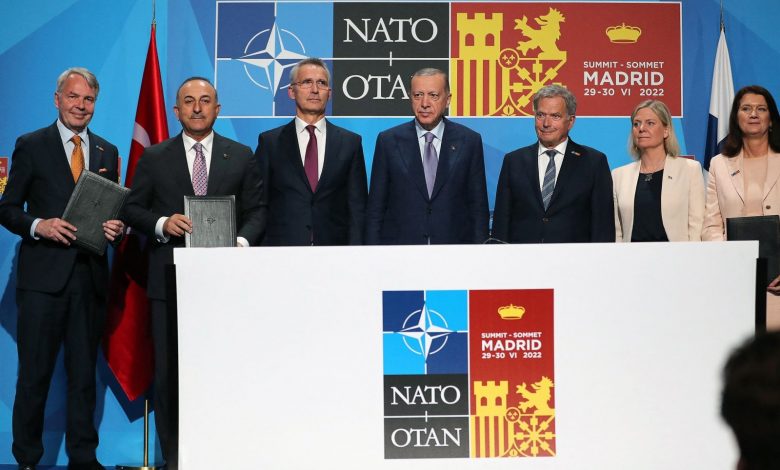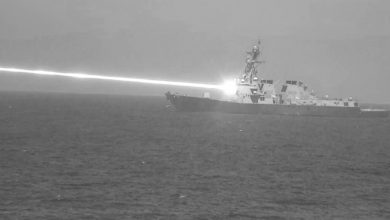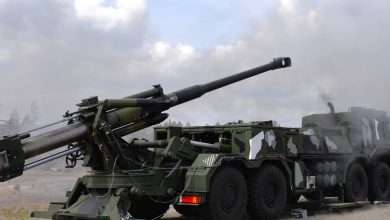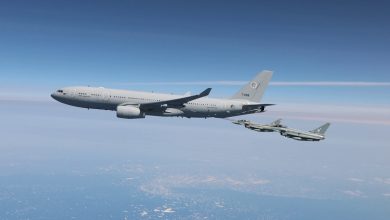Analysis: Turkiye, Sweden, Finland deal positive yet challenges remain

The recent deal struck between Turkey, Sweden and Finland on the sidelines of the NATO leaders summit in Madrid, addressing Ankara’s security concerns, is valuable in that the sides have displayed the will to find a middle ground; however, certain challenges remain regarding its implementation, experts said.
“The trilateral agreement signed in Madrid is a good deal but of course, being a memorandum of understanding, it should be properly implemented in the next weeks,” Italy’s former Ambassador to Turkey Carlo Marsili told Daily Sabah.
“As a matter of fact, Sweden and Finland should understand that Turkish concerns on terrorism and arms embargo are legitimate, as stressed by Secretary-General (Jens) Stoltenberg,” the ambassador pointed out.
Similarly, Berkay Mandıracı, senior analyst at the Crisis Group, said: “It is positive that, defying most expectations, the sides have taken a step forward in resolving their standoff at the Madrid summit. However, challenges regarding the trilateral agreement’s implementation remain.”
Mandıracı elaborated that many of its articles “cut to the core of differing legal definitions and applications of what is considered ‘terrorism.’”
Turkey, Sweden and Finland signed a joint memorandum last week that allowed NATO to move ahead with inviting the Nordic countries to the military alliance that seeks to enlarge and strengthen in response to Russia’s invasion of Ukraine.
Their membership applications were held up until the last moment by Turkey, which sought guarantees that the Nordic countries would join Turkey’s fight against PKK-linked terrorists and swiftly extradite suspects.
The dispute was resolved by a 10-point memorandum that appeared to address many of Turkey’s terrorism concerns and lift an arms embargo on Ankara imposed in response to Turkey’s 2019 military operation into Syria.
“I do hope that the two Scandinavian Governments will abide by Ankara’s requests, otherwise Turkey will have the right not to accept their NATO membership,” Marsili added, saying that Ankara, through lifting the veto but still clarifying its conditions, has reinforced its position in NATO.
“Turkey’s parliamentary ratification will probably come after Ankara regards its expectations as met. But defining mutually agreeable parameters will not be easy, which may still drag out the standoff,” Mandıracı highlighted.
The Nordic countries’ accession still needs to be approved by the parliaments of all 30 NATO members – a process that could take months – and President Recep Tayyip Erdoğan has warned that Turkey’s Parliament could refuse to do so.
Mandıracı continued to say that it remains to be seen whether Sweden and Finland’s stance toward groups Ankara considers terrorist organizations will change in practice following the deal.
Turkey has frequently voiced criticism of the Nordic countries’ conduct toward the PKK and its Syrian affiliate, the YPG, saying that weapons as well as support have been provided to the groups while underlining that terrorist groups have a strong presence in especially Stockholm.
Most recently, images spread on social media showed parliamentarians from the Left Party, which opposed Sweden’s decision to apply for NATO membership, posing with flags from the PKK, the YPG and the women’s wing YPJ – a move heavily criticized by Sweden’s Prime Minister Magdalena Andersson. “The PKK is a designated terrorist organization, not just in Sweden, but in the EU and posing with such flags is extremely inappropriate,” Andersson said.
Sweden’s Left Party is not part of the government but is helping prop up Andersson’s Social Democrat Cabinet.
Amineh Kakabaveh, an independent Swedish lawmaker and former terrorist fighter on whom the Social Democrat government has repeatedly relied for its survival in close parliament votes, had described the day of the signing of the trilateral deal with Turkey as a “black day for Swedish foreign policy.”
Marsili reiterated that: “The Swedish Government has twice survived only thanks to a deal with a Swedish Kurdish member of Parliament that includes support for PKK terrorists. The YPG is the other face of the same medal even if sometimes media and public opinions in Europe do not seem to understand that and make a lot of confusion between Kurds and PKK/YPG.”
The ambassador asked further: “If NATO’s target is – as it is – to preserve the territorial integrity of the member states, the question is: How can Sweden and Finland join NATO if they host – as they host – several PKK/YPG leaders, whose target is to divide the Turkish state into two?”
Mandıracı, on the other hand, warned that the trilateral agreement is rather vague on what steps would meet Ankara’s demands on this front and which timeframe would apply.
According to the signed memorandum, Finland and Sweden pledged not to support the PKK and its Syrian branch the YPG or the network of U.S.-based Fetullah Gülen, which staged a 2016 coup attempt in Turkey and was labeled as a terrorist organization. The signed memorandum did not list any individuals for extradition.
“As prospective NATO Allies, Finland and Sweden extend their full support to Turkey against threats to its national security. To that effect, Finland and Sweden will not provide support to the YPG/PYD, and the organization described as FETÖ in Turkey,” the trilateral memorandum read.
Regarding the Gülenist Terror Group (FETÖ) being mentioned in the trilateral agreement, Marsili said: “As a matter of fact, FETÖ is a terrorist organization for Turkey but not yet for other allied countries. I think that it has been correctly mentioned in the agreement, because it means a precedent which can turn useful for the future. And that could have repercussions not only in Europe but in the U.S. as well.”
Extraditions, ‘thorny’ issue
Mandıracı emphasized that the question of extraditions remains thorny “as the issue goes beyond the countries’ governments.”
“Independent courts in the two Nordic countries evaluate requests on a case-by-case basis. These requests can only be followed through if they meet applicable evidentiary standards for terrorism-related crimes, for which, compared to Turkey, the bar is higher in the two Nordic countries,” he said further.
Erdoğan had stated that Turkey expects 73 terrorists to be extradited. “They have sent 3-4 of them so far, but that is not enough.”
Andersson, on the other hand, said Sweden would continue to follow local and international law in its extraditions and that the process would depend on what information was received from Turkey.
Saying that Ankara’s extradition of suspected terrorists is a legitimate request, Marsili said: “For instance, Italy did that with France on different occasions but not always successfully. We now have to follow the process in Sweden. I cannot exclude further tensions on this issue but it will depend on how many terrorists will be effectively extradited.”
Turkey’s Western allies designate the PKK as a terrorist group but not the YPG, which the United States has partnered with to fight the Daesh terrorist group in Syria despite Ankara’s objections. The PKK launched its insurgency against the Turkish state in 1984. More than 40,000 people have been killed in the conflict.
Turkey, a NATO member of more than 70 years and with the alliance’s second-biggest army, has long demanded that allies halt support for the PKK/YPG.
It has repeatedly traded barbs with the United States, France, Germany, the Netherlands and others over the matter.
DailySabah





